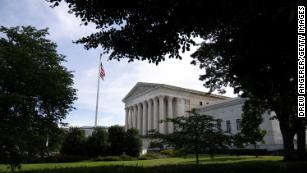DICTATORSHIP OF THE BOURGEOISE Supreme Court rules California must pay private businesses to allow union access
By Ariane de Vogue and Veronica Stracqualursi, CNN
Wed June 23, 2021
(CNN)The US Supreme Court said Wednesday that California cannot allow unions to enter the private property of agricultural businesses to address workers unless the businesses are compensated for the visit, in a case that could have broad property rights implications.
The ruling will imperil not only union organizers in California seeking to reach workers but could make it more difficult for the government to allow temporary access in other areas.
Chief Justice John Roberts wrote the 6-3 decision. Justice Stephen Breyer, joined by his liberal colleagues Justices Sonia Sotomayor and Elena Kagan, dissented, emphasizing the power of the strong conservative majority.
"Perhaps for the first time since Justice Amy Coney Barrett joined the court in October, here we see the full force of the new 6-3 conservative majority embracing a broad view of property rights both in general and at the specific expense of organized labor," said Steve Vladeck, CNN Supreme Court analyst and professor at the University of Texas School of Law.

READ: Supreme Court opinion in California unions and property rights case
"Indeed, it's just the third time all term that the court split right down party lines in a signed opinion and the first in a non-criminal case," Vladeck said. "In that respect, it is, almost certainly, a harbinger of things to come."
The case involved a challenge to a California state law that allows union organizers to enter the property of a business three times a day for 120 days a year. Organizers are permitted a one-hour visit to speak to workers during break time.
While unions don't need to obtain an employer's consent before entering the property, they have to file written notice of their intent with the state's Agricultural Labor Relations Board.
Two agricultural businesses, Cedar Point Nursery, a strawberry grower, and Fowler Packing Corporation, a shipper of grapes and citrus, challenged the law as applied to them.
The dispute pitted agricultural businesses and property rights advocates against big labor unions and raised questions concerning when the government can allow access to private property without compensation.
"The access regulation amounts to simple appropriation of private property," Roberts wrote in the majority opinion. He added that the "access regulation grants labor organizations a right to invade the growers' property. It therefore constitutes a per se physical taking. "
Roberts suggested that the ruling would not impact the ability of the government to come on to property for health and safety inspections because such access is beneficial to the agricultural employers and the public.
The lawyer for the two businesses, Joshua Thompson of the Pacific Legal Foundation, had argued that the regulation violated the Fifth Amendment, which reads that private property cannot be taken by the government for public use "without just compensation."
He told the justices that the law allows the union members onto the property against the wishes of the businesses and amounts to a "taking" of the property without compensation. He equated the visits to a permanent physical invasion of the property and said it didn't matter that entry was only allowed during a limited time frame because the right to access was permanent.
In general, the courts have allowed the government to place "use restrictions" on private property without compensation, such as those related to zoning laws. But when the government allows a structure or a person to be on the property permanently, it must compensate the property owner.
California's Solicitor General Michael Mongan, who was appointed by the state's Democratic leadership, defended the law, saying that it authorized only a limited number of organizers to enter the farms for the sole purpose of speaking with employees under strict time limits.
The California Agricultural Labor Relations Act was enacted in 1975 because of union organizers' typical inaccessibility to farmworkers, who are sometimes migratory, following one harvest to the next, live in temporary housing and lack modern technology and English language skills.
The Biden administration supported California's position in the case, a change from the previous Trump administration, which had backed the employers.
Lower courts had ruled against the businesses, holding that the right of access to the property does not qualify as a "taking" under the law because the access is not permanent.
Lower courts had ruled against the businesses, holding that the right of access to the property does not qualify as a "taking" under the law because the access is not permanent.
The 9th US Circuit Court of Appeals noted that the regulation did not "allow random members of the public to unpredictably traverse their property 24 hours a day, 365 days a year."
Writing for his liberal colleagues, Breyer said that the access at issue in the case was "temporary," not "permanent," and therefore it does not constitute a government "taking" under the law. He said that the agricultural employers are not "forever denied" any power to control the use of their property.
The regulation, Breyer said, is "not functionally equivalent to the classic taking in which government directly appropriates private property or ousts the owner from his domain."
He also questioned the reach of the opinion, expressing fear, for instance, that a landowner might reject a law authorizing temporary access "to verify proper preservation of wetlands or the habitat enjoyed by an endangered species, or for that matter, the safety of inspected meat."
No comments:
Post a Comment